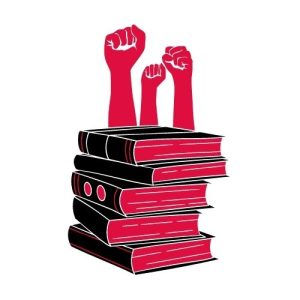Hyperlinked communities are an especially important part of library discourse, as it is libraries who help lead our communities by providing access to knowledge, resources, and safe spaces to build and grow diversity. As the United States faces an administration that is, seemingly, determined to undermine facts and to eradicate all efforts of diversity equity, and inclusion in our systems, it is more important than ever for libraries to take initiative and lead the way in building strong communities that advocate for its users, while providing equitable service and access. As Garcia-Febo (2018) explains, we need to be “creating institutions that expand minds and open futures” through love, empathy, and open hearts.

At a time when American institutions are repealing rights from marginalized groups, libraries stand as a beacon of hope to our communities. As Jensen (2017) explains, “It’s impossible to be a neutral space with the goal of reaching a community”. The inherent nature of libraries is political—to educate, to stand up to injustice, to fight misinformation, and to provide free resources to the underserved. By providing equal access and equitable services to our communities, libraries provide a space to educate people from diverse backgrounds; to include and represent everyone. While the Trump administration takes away federal funding, removes DEI terminology from professional vocabulary, and censors and bans the books and information allowed in library spaces, librarians still fight back.
Founded by Brooklyn Public Library, a network of libraries across the U.S. have come together to create Books Unbanned; a system inspired by the ALA’s Freedom to Read Statement and Library Bill of Rights, made to combat book bans across the U.S. (Books Unbanned, n.d.). Books Unbanned gives free digital library cards to teens and young adults, in the effort to give access to banned books in places where censorship and book banning laws have gone into effect. This equitable access initiative is a prime example of building a hyperlinked community. By using modern technology, namely e-book collections, libraries are fighting to keep all books accessible to all people.

It is important for libraries to acknowledge all forms of access barriers and how to address these through services and community building. As we face increasing efforts to undermine education and diverse sources of information, it is more important now than ever for libraries to stand together in uplifting our communities through access initiatives, and diverse and inclusive materials. I resonate deeply with the ideas mentioned by Garcia-Febo (2018) and Stephens (2016) in leading and learning from the heart with our work as library and information professionals. This notion will lead us far in our work and the ongoing fight for intersectionality, diversity, equity, and inclusion in libraries. When libraries strive to create spaces that include diverse materials with representations of all people, we are successful in creating hyperlinked communities.
References:
Garcia-Febo, L. (2018, November 1). Serving with love: Embedding equality, diversity, and inclusion in all that we do. American Libraries Magazine. https://americanlibrariesmagazine.org/2018/11/01/serving-with-love/
Jensen, K. (2017, February 10). Libraries resist: A round-up of tolerance, social justice, & resistance in US libraries. Book Riot. https://bookriot.com/libraries-resist-round-tolerance-social-justice-resistance-us-libraries/
Stephens, M. (2016). The heart of librarianship: Attentive, positive, and purposeful change. ALA Editions.
Krista – your last paragraph is a call to action and a path forward for these times. I really appreciate your thinking around these ideas.
Hi Krista! Your blog resonates with me not only because of the relevance to the MLIS, but also because I am a Reading Specialist. I lived and taught in Texas for 11 years, and I’m seeing past coworkers start mentioning what books are banned in their districts. Even more liberal (by Texas standards) districts are banning books. Thank you for reminding me of the Books Unbanned project! I’ll have to spread the word to my former colleagues
Thank you Krista for this powerful message! The irony of this struggle is that by removing diverse materials, we remove the very tools people could use to become aware of the variety of human experience. We should all take a moment to listen (or read) instead of shutting down things we don’t understand because they don’t reflect the pinhole view that is our singular life versus billions of lives.